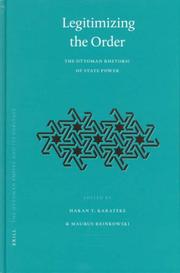| Listing 1 - 10 of 16 | << page >> |
Sort by
|
Digital
ISBN: 9783112401248 9783879972425 Year: 2021 Publisher: Berlin Klaus Schwarz Verlag
Abstract | Keywords | Export | Availability | Bookmark
 Loading...
Loading...Choose an application
- Reference Manager
- EndNote
- RefWorks (Direct export to RefWorks)

ISBN: 3112401247 3879972427 Publisher: Klaus-Schwarz-Verlag GmbH
Abstract | Keywords | Export | Availability | Bookmark
 Loading...
Loading...Choose an application
- Reference Manager
- EndNote
- RefWorks (Direct export to RefWorks)
Book
ISBN: 383940715X 3899427157 9783839407158 Year: 2015 Publisher: Bielefeld transcript Verlag
Abstract | Keywords | Export | Availability | Bookmark
 Loading...
Loading...Choose an application
- Reference Manager
- EndNote
- RefWorks (Direct export to RefWorks)
Muss und kann die Islamwissenschaft dem Anspruch gerecht werden, auf jede Frage zum Islam und den Muslimen eine passende Antwort zu haben? Verstärkt nicht die Islamwissenschaft eher in der deutschen Öffentlichkeit verbreitete (Vor-)Urteile, als dass sie einen aufklärerischen und erklärenden Beitrag leisten könnte? Ist es der Islamwissenschaft überhaupt gelungen, sich von den Paradigmen des Orientalismus des 19. Jahrhunderts zu befreien? Der Sammelband zeigt ein ehemaliges »Orchideenfach«, das sich mit großen Erwartungen von Politik und Öffentlichkeit konfrontiert sieht und widerstreitende Antworten auf diese Herausforderung gibt. »Der Sammelband fasziniert durch die Vielfalt der interdisziplinären und kontroversen Positionen.« Jos Schnurer, www.socialnet.de, 17.05.2008 »[Das macht] es spannend: eine interne Debatte, mit einem zumindest teilweise ›jungen‹ Ansatz.« Gudrun Harrer, Der Standard, 05.07.2008 »Insgesamt gesehen bietet der zu besprechende Sammelband [...] eine Reihe [...] hochinteressanter und sehr anregender Beiträge.« Stephan Conermann, www.sehepunkte.de, 1/9 (2009) Besprochen in: Islamische Zeitung, 11 (2008), Kathrin Klausing
Education --- Education. --- Educational Policy. --- Islamic Studies. --- Science. --- Sociology of Science. --- University. --- Orientalistik; Islam; Islamwissenschaft; Geisteswissenschaften; Wissenschaft; Bildung; Wissenschaftssoziologie; Universität; Bildungspolitik; Islamic Studies; Science; Education; Sociology of Science; University; Educational Policy
Book
ISSN: 18697054 ISBN: 311030760X 3110338270 9783110338270 9783110372991 3110372991 9783110307603 9783110338287 3110338289 1306529069 Year: 2014 Volume: 29 Publisher: Berlin/Boston
Abstract | Keywords | Export | Availability | Bookmark
 Loading...
Loading...Choose an application
- Reference Manager
- EndNote
- RefWorks (Direct export to RefWorks)
Conspiracy Theories in the United States and the Middle East is the first book to approach conspiracy theorizing from a decidedly comparative and interdisciplinary perspective. Whereas previous studies have engaged with conspiracy theories within national frameworks only, this collection of essays draws attention to the fact that conspiracist visions are transnational narratives that travel between and connect different cultures. It focuses on the United States and the Middle East because these two regions of the world are entangled in manifold ways and conspiracy theories are currently extremely prominent in both. The contributors to the volume are scholars of Middle Eastern Studies, Anthropology, History, Political Science, Cultural Studies, and American Studies, who approach the subject from a variety of different theories and methodologies. However, all of them share the fundamental assumption that conspiracy theories must not be dismissed out of hand or ridiculed. Usually wrong and frequently dangerous, they are nevertheless articulations of and distorted responses to needs and anxieties that must be taken seriously. Focusing on individual case studies and displaying a high sensitivity for local conditions and the cultural environment, the essays offer a nuanced image of the workings of conspiracy theories in the United States and the Middle East.
Conspiracy theories --- Political culture --- Conspiracies --- History --- Political crimes and offenses --- History. --- Errors, inventions, etc. --- Conspiracy --- United States --- Middle East --- Civilization --- Politics and government --- Relations --- Conspiracy theories - United States --- Conspiracy theories - Middle East --- Conspiracy - United States --- Conspiracy - Middle East --- Political culture - United States - History - 20th century. --- United States - Civilization --- Middle East - Civilization --- United States - Politics and government --- Middle East - Politics and government --- United States - Relations - Middle East --- Middle East - Relations - United States --- Comparative analysis. --- Conspiracy theories. --- Middle East. --- Transnational narratives. --- United States of America.
Book
ISBN: 9783525310441 3525310447 Year: 2013 Publisher: Göttingen : Vandenhoeck & Ruprecht,
Abstract | Keywords | Export | Availability | Bookmark
 Loading...
Loading...Choose an application
- Reference Manager
- EndNote
- RefWorks (Direct export to RefWorks)
World politics --- Imperialism --- Politique mondiale --- Impérialisme

ISBN: 3110184559 3110910489 Year: 2005 Publisher: De Gruyter, Inc.
Abstract | Keywords | Export | Availability | Bookmark
 Loading...
Loading...Choose an application
- Reference Manager
- EndNote
- RefWorks (Direct export to RefWorks)

ISBN: 9004144226 9786610868193 1429453311 9047407644 1280868198 143370515X 9781429453318 9781433705151 9789004144224 9781280868191 6610868190 9789047407645 Year: 2005 Volume: 34 Publisher: Leiden Boston Brill
Abstract | Keywords | Export | Availability | Bookmark
 Loading...
Loading...Choose an application
- Reference Manager
- EndNote
- RefWorks (Direct export to RefWorks)
The various strategies as to how the Ottoman sultans and the ruling elite tried to inculcate their understanding of authority and legitimacy into the Ottoman population are the focus of the articles in this collected volume.
Legitimacy of governments --- State, The. --- Turkey --- Politics and government. --- Administration --- Commonwealth, The --- Sovereignty --- Political science --- Governments, Legitimacy of --- Legitimacy (Constitutional law) --- Consensus (Social sciences) --- Revolutions --- State, The --- General will --- Political stability --- Regime change
Book
ISBN: 3486578596 Year: 2005 Publisher: München R. Oldenbourg Verlag
Abstract | Keywords | Export | Availability | Bookmark
 Loading...
Loading...Choose an application
- Reference Manager
- EndNote
- RefWorks (Direct export to RefWorks)
Book
ISBN: 9798887192185 9798887192161 Year: 2023 Publisher: Boston, MA
Abstract | Keywords | Export | Availability | Bookmark
 Loading...
Loading...Choose an application
- Reference Manager
- EndNote
- RefWorks (Direct export to RefWorks)
A comprehensive, readable history of the Republic of Turkey that gives equal weight to all periods in the first century of the Republic of Turkey.The republican order of Turkey seems not to have changed much since its foundation in 1923, but there were dramatic transformations: From Atatürk's modernization dictatorship in the 1920s and 1930s, over the massive migration into the cities and the military coups in the second half of the twentieth century, up to Recep Tayyip Erdoğans electoral autocracy since the 2010s. This book makes us understand Turkey's historical trajectory in the nineteenth and twentieth centuries and the fate of its various communities and ethnic groups-in particular Alevis and Kurds-and argues that a particular trait of Turkish political culture is its constant fluctuation between confidence and contention, grandeur and grievance.
Digital
ISBN: 9798887192185 Year: 2023 Publisher: Boston, Mass. Academic Studies Press
Abstract | Keywords | Export | Availability | Bookmark
 Loading...
Loading...Choose an application
- Reference Manager
- EndNote
- RefWorks (Direct export to RefWorks)
| Listing 1 - 10 of 16 | << page >> |
Sort by
|

 Search
Search Feedback
Feedback About UniCat
About UniCat  Help
Help News
News